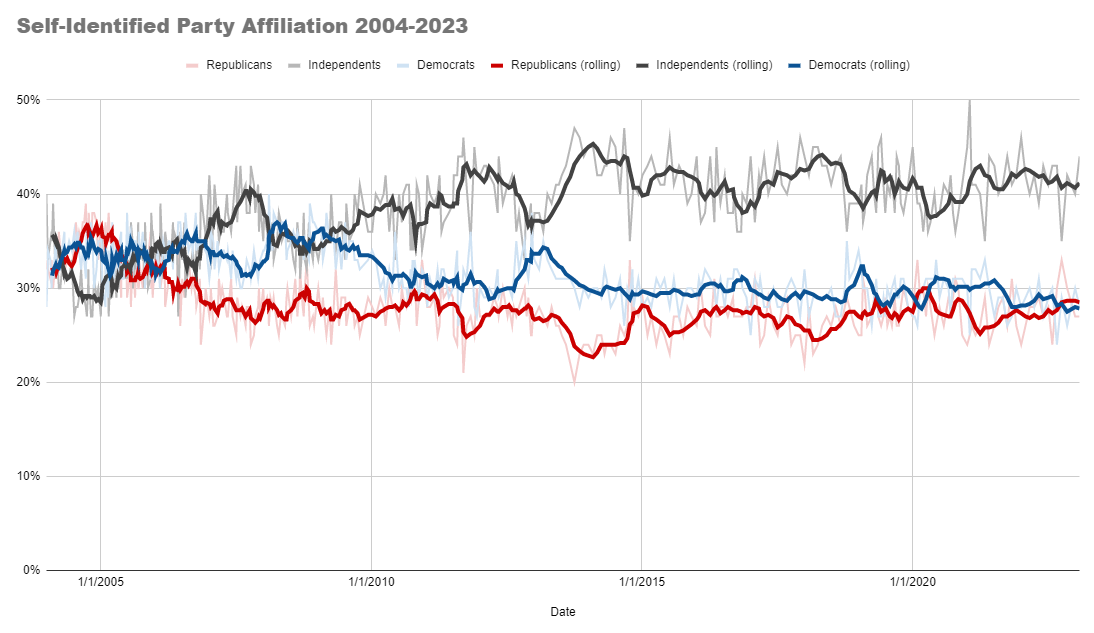Submitted by Tyler_Zoro t3_11ewogp in dataisbeautiful
Comments
[deleted] t1_jagj5ot wrote
[removed]
hatersaurusrex t1_jagjj65 wrote
"I'm a sensible moderate and can see party politics has totally devolved into the WWE, but reluctantly choose between one of two pandering, ineffective fully special-interest owned sycophants every single cycle because the henhouse is being held hostage by the foxes who have a gun to my sacred unicorn's head"
-Most of America, by far
value_bet t1_jago9my wrote
Most of America, by far?! Did you look at the graph? Only 40% are independent. Most of America (almost 60%) actually likes one party or the other well enough to register as a member.
hatersaurusrex t1_jagpfrk wrote
Yes, I did indeed see that fans of The Rock, when added to those of Steve Austin, statistically outnumber those who know that wrestling is a fixed sham and maybe throwing elbows at each other isn't the best method of political discourse, but feel trapped and compelled to root for one or the other since there's no viable third option in a rigged system.
Who would you suggest comes in with the chair?
berniman t1_jah1r6u wrote
Interesting to see how negatively correlated Democratic Membership and Independents are. This speaks about how centered the American population really is…and why Biden is trying to appeal to that middle.
PredictorX1 t1_jah5cfr wrote
I think it'd be interesting to separate independents who are really either: 1. mixed opinion Republican/Democrat or 2. late-decision Republican or Democrat undecideds from people who consistently adhere to other parties (Libertarian, Greens, etc.).
Tyler_Zoro OP t1_jahjxm8 wrote
Gathering data on party affiliation is hard work. Anything beyond the surface level (and to some extent even that) is fraught with all sorts of skewed reporting and biases, plus it's insanely expensive to gather comprehensive data.
Of course, how people actually vote isn't data that anyone gets, so to some extent, it's all guesswork.
The chart I've produced here is mainly intended to highlight the fact that there is a large and growing group who no longer publicly associate themselves with the two major political parties, and that at this point they are the largest demographic (they were a minority demographic in 2004).
PredictorX1 t1_jahkhid wrote
You make very good points, and I appreciate your work on this. Still, I think it's worth at least pointing out the subtlety of the "independents".
phdoofus t1_jahmnyi wrote
Translation: "both sides are the same". Disagree, but you do you.
Tyler_Zoro OP t1_jahmote wrote
Of course. It's a self-identification only and should not be read as meaning more than "they didn't want to identify as a specific party." The change in that over time is what's interesting.
hatersaurusrex t1_jaht015 wrote
Translation: Only idiots think Ric Flair is better than Dusty Rhodes, but WHOOOO do WHOOOOOOOOOO, baby.
[deleted] t1_jaht4dh wrote
[removed]
InsuranceToTheRescue t1_jahx1c2 wrote
I always say that I'm practical. While I'm registered as a Dem, and have mostly voted for Dems, I live in a very heavily red area. I'm confident that if it was ever found out that I'm not a registered Republican, that pretty much everyone at both my jobs would harass me into quitting and/or moving.
Which makes the bartending a little difficult. Bunch of drunks talking politics and I'm sitting over here choosing my words carefully to make sure that they're largely blanket statements that don't really indicate who I'm talking about.
sprflyninja t1_jahyqyo wrote
To me I think this speaks to people being afraid of the hard label "democrat" or "republican". The average American is capable of understanding the nuance in the arguments of either side. Most people, if they're honest with themselves, always find themselves somewhere between Democrat and Republican when it comes to individual issues.
Tyler_Zoro OP t1_jawjviy wrote
> Who would you suggest comes in with the chair?
/r/EndFPTP would be my preference ;-)
Tyler_Zoro OP t1_jawkkm7 wrote
> "both sides are the same".
This is a very weak take.
If you're offered the choice of drinking poison or having your toenails ripped out, those options are absolutely not the same. But that doesn't mean that we should all line up in pro-toenail-ripping and pro-poison camps and start defending our tribalistic in-groups.
Both of those are terrible options even if they have radical and substantial differences, and we might even describe one as objectively "better" than that other. The fact that there are a myriad of other options is also important information.
Here in the US, political parties are locked down by the voting system we use. There is a substantial effort to move away from that voting system, which has seen major successes over the past 10-20 years, and continues to do so. Please support /r/EndFPTP and related communities in moving forward, rather than just pushing false dichotomies.
phdoofus t1_jawm34g wrote
Speaking of 'false equivalencies'

Tyler_Zoro OP t1_jaggxtr wrote
Source: Party Affiliation, Gallup
Tool: Google Sheets, Chart tool, line chart without smoothing.
Series: each raw series provided by Gallup is presented in light coloration and overlaid with a 6-value-rolling-average in darker coloration.
Edit: My sheet with the data